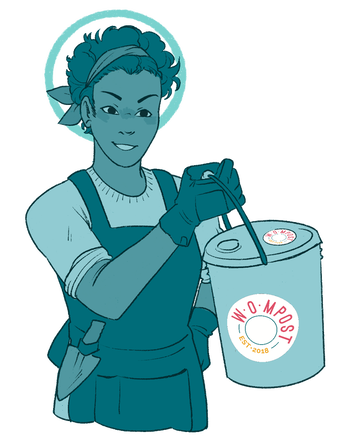Are you passionate about our mission?
Would you like to help us reach more people and divert more waste from landfills?
Become a:
Wompost Warrior!
Would you like to help us reach more people and divert more waste from landfills?
Become a:
Wompost Warrior!
|
Why Become a Wompost Warrior? ✦ Help us grow the planet! ✦ Get a Wompost Warrior badge on your Wompost profile! ✦ Be a part of the Wompost Warrior community! |
|
What can I do to help?
✦ #1 Get 10 new people to sign up for Wompost ✦ #2 Ask your favorite restaurant and your office to start composting with Wompost ✦ #3 Ask your local HOA or Neighborhood Association to get a bid for composting service for every home If this sounds like a challenge you'd love to sink your teeth into you can Click here to order your Wompost Warrior materials! We are very close to having seed paper business cards and door hangers for you. Right now, we have digital copies of flyers, posters, banners, and businesses cards to share. |
|
What can I tell my neighbors about Wompost? Pricing: Weekly Compost Drop off - $9.09/month 6 Gallon weekly curbside compost collection - $33.33/month or $366.63/year 35 Gallon weekly curbside compost collection - $39.39/month or $433.29/year 65 Gallon weekly curbside compost collection - $47.47/month or $522.17/year What Customers Get: ✦ 24/7 access to composting drop-off bins ✦ Weekly curbside pickup ✦ Customer portal with text message reminders, and the ability to skip for a $5 or $7 credit when you're out of town ✦ Up to 60 gallons of compost soil rebate per year ✦ Half off our landscaping services for hauling large amounts of yard waste, or large compost soil deliveries ✦ To be part of an amazing family of Womposters! |
|
How do I explain composting to someone?
There are wonderful resources available on the benefits of composting! A great place to start with the basics of how compost is helpful in the fight against climate change is the Kiss the Soil series. |
|
We also work with Zero FoodPrint, an awesome organization dedicated to carbon farming and regenerating soil health! 1% of our subscription costs goes towards helping them grow. You can learn more about them at www.zerofoodprint.org/about |
Frequently Asked Questions
What Can I Compost?
Most anything that is made of biodegradeable and/or organic material can be composted! Even some items which may not be suited to backyard composting - such as citrus rinds, cooked meat, bones, and weeds - can be processed by our commercial facility. Everything from paper, to food scraps, to cotton!
What CAN'T be composted?
Anything that is a man made material cannot be composted - even if it's only a part of it! That means no plastic at all, no metal, foil, glass, ceramic, polyester, etc. Even if only part of the packaging is plastic, we cannot take it unless the plastic is removed. That means that things like milk cartons - which are plastic lined, or items such as latex gloves, cannot go in the compost.
Why is spreading the word important?
The more people start composting, the less organic waste goes into landfills. In the U.S., roughly 70% of waste sent to landfills is biomatter. That means we could be diverting 70% of our trash away from the landfills, where it would be buried and turned into methane gas, and instead turn it into nutritious compost soil.
What are the benefits of compost soil?
Finished Compost soil is full of nutrients and benefits! It helps to draw more carbon into the soil, promoting health of the microbes living in the soil that make plant systems strong. It also improves soil water retention, meaning plants need water less often. Additionally, compost if packed with nutrients that helps plant root systems to thrive, making them bigger,m stronger, healthier, and better food for us. It's a win-win-win!
Most anything that is made of biodegradeable and/or organic material can be composted! Even some items which may not be suited to backyard composting - such as citrus rinds, cooked meat, bones, and weeds - can be processed by our commercial facility. Everything from paper, to food scraps, to cotton!
What CAN'T be composted?
Anything that is a man made material cannot be composted - even if it's only a part of it! That means no plastic at all, no metal, foil, glass, ceramic, polyester, etc. Even if only part of the packaging is plastic, we cannot take it unless the plastic is removed. That means that things like milk cartons - which are plastic lined, or items such as latex gloves, cannot go in the compost.
Why is spreading the word important?
The more people start composting, the less organic waste goes into landfills. In the U.S., roughly 70% of waste sent to landfills is biomatter. That means we could be diverting 70% of our trash away from the landfills, where it would be buried and turned into methane gas, and instead turn it into nutritious compost soil.
What are the benefits of compost soil?
Finished Compost soil is full of nutrients and benefits! It helps to draw more carbon into the soil, promoting health of the microbes living in the soil that make plant systems strong. It also improves soil water retention, meaning plants need water less often. Additionally, compost if packed with nutrients that helps plant root systems to thrive, making them bigger,m stronger, healthier, and better food for us. It's a win-win-win!



